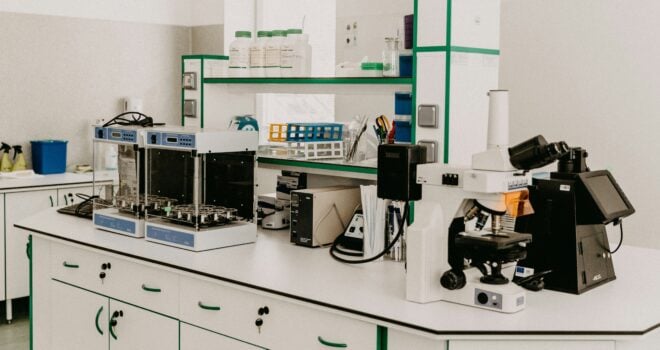Unique? They are. They are silent, unobtrusive; one scarcely realizes the life that’s in them. But it’s there.
To a court in Alabama, not only are they alive, they are “extrauterine children.” And the controversy surrounding them isn’t going away anytime soon. The concerns they conjure in the American psyche deal with “inflammatory” issues in our society, issues that many have not wanted to consider, or worse, admit: namely, when life begins, what the right-to-life means, whether an embryo is a human being, the rights of embryos, when life achieves personhood and their rights under the Constitution, bioethics, even eugenics.
The Alabama Supreme Court in February of this year created chaos and hysteria. Politicians and reproductive medicine advocates were particularly exercised with no small amount of what the Bible calls “gnashing of teeth” in the mainstream press. Terms like “Christian nationalism” were invoked to hype the moment and draw attention to one’s agenda, one’s cause celebre. Controversy arose after the court issued a decision declaring cryogenically frozen embryos to be “extrauterine children,” human beings with “personhood,” a right to live.
In LePage v. Center for Reproductive Medicine, P.C., a fertility clinic that neglected to properly secure its frozen embryo nursery from a prying patient was found in breach of Alabama’s Wrongful Death of a Minor Statute, after several embryos were killed. The court found that the parents of the dead embryos were within their rights to sue the clinic.
The Alabama case is of paramount importance. It essentially forces America to deal with two pivotal issues we have been grappling with for years. First, with respect to the issue of right-to-life, the jurists made the law follow science. The overwhelming consensus among biological scientists is that life begins with conception at fertilization, declaring that an embryo is alive, and it therefore has life. Steven Andrew Jacobs of Northwestern Pritzker School of Law, University of Chicago, is clear in his assessment:
Peer-reviewed journals in the biological and life sciences literature have published articles that represent the biological view that a human’s life begins at fertilization (“the fertilization view”). As those statements are typically offered without explanation or citation, the fertilization view seems to be uncontested by the editors, reviewers, and authors who contribute to scientific journals. Overall, 95% of all biologists reviewed affirmed the biological view that a human’s life begins at fertilization (5212 out of 5502).
(Jacobs, 2018, “Biologists’ Consensus on ‘When Human Life Begins‘”)
Up until the time of the Alabama case, that is where the matter stood. Life begins at conception, but no court or legislature (federal or state) has dared (politically) to comment on the status of that life as a “human being.”
The hesitation occurs because with the status of humanness comes the delicate issue of personhood. And with the latter comes the issue of rights. If embryos are humans and therefore persons, what rights do they have under the Constitution? Are they protected by the 14th Amendment’s equal protection and due process clauses under the law?
The Alabama Supreme Court seems to think so. The Court held that any exceptions for the wrongful death statute not to cover ‘extrauterine children’ would violate the 14th Amendment’s equal protection clause. The latter prohibits states from withholding protections from people based upon “immutable features of their birth or ancestry,” according to Justice Mitchell’s opinion for the majority.
The second issue the court dealt with is that of personhood. At this point the justices potentially stepped outside of science and into the realm of society and culture. By referring to the embryos as “extrauterine children” (those conceived outside the womb), the court bestowed the status of humanness (personhood) on them. And as we spoke of earlier, this means that the politically thorny issue of Constitutional rights comes to the foreground. Thus, pandemonium ensues amongst the media, politicians, and those with a vested interest in the controversy—reproductive rights activists and prospective parents through the process of IVF (In Vitro Fertilization).
There is considerable fallout from various public interest groups with an agenda (IVF clinics and doctors, abortion advocates, reproductive rights advocates, medical reproductive associations, anti-religious groups, secularists, etc.). All have joined in the furor over the case.
We should, before proceeding further, understand the magnitude of the issues involved. Consider that there are more than a million embryos stored in freezers across the United States. For the moment, in vitro fertilization (IVF), the way it is currently practiced, is deemed ethically acceptable by the medical community; however, research with human embryos (which often damages or kills them) is typically employed to improve IVF success. “Such technology raises serious ethical concerns which are in need of constant revisiting.”
For those unfamiliar with the IVF process, it is full of office visits and tests. IVF patients take hormones for one to two weeks to stimulate the ovaries which produce many mature eggs. These eggs are then collected via a surgical procedure and fertilized with sperm in a laboratory. The embryos produced are monitored, often biopsied and frozen for further testing. At some point an embryo is implanted in the uterus. The IVF process can take up to two months to complete. Throughout the process of fertilization, development, and testing embryos in a laboratory, as many as 50% to 70% of them will not survive. In other words, with IVF, it’s trial and error.
There are other voices in America that acknowledge embryonic life but reject the idea of embryos actually being human or having rights. Liah Greenfeld, Ph.D., writing for Psychology Today, offers the view of humanness from a psychologist’s perspective. Her view is essentially that culture distinguishes humanity from other life. She writes:
The life of an animal organism, obviously, begins at conception. But human life begins only at the moment that the animal has a mind. In some very fast developers, this can happen before the age of one year; in a large majority of cases, this happens between two and three years of age.
Classical liberalism in the American tradition understands humanity quite differently. It has always held that a divine providence “endowed” humanity with rights that were therefore natural and not a function of human intervention. It held that there was a natural order to the universe and a natural law. It is the latter which operates as an ethical principle from which natural rights are derived and through which humans recognize their freedom. The fundamental thesis affirmed here is best articulated by St. Thomas Aquinas:
Natural law is a participation in the eternal law of God.
To the classical liberal in America, human freedom in one’s life was justified through an appeal to that which is the basis for why there is something rather than nothing—why the universe is rather than is not—without recourse to any human or human institution.
While it is not only important but necessary to consider the concerns of parents opting for IVF, and the views of others from a cultural perspective, they should not be the immediate or only priority. The issues warranting address initially are those regarding the embryos themselves (read “life itself”)—before prioritizing consideration to those issues ancillary to the life that has been purposely created.
If the bedrock issues are about life and rights attendant to it, societal decisions and their implementation must neither be a function of economics (how much money will be lost/gained) or democracy (how many people think embryos are alive and deserve Constitutional protection as human beings).
Pertinent issues regarding families and society should be examined, but not at the expense of what the Alabama Supreme Court already calls children.
Photo by Trnava University on Unsplash










